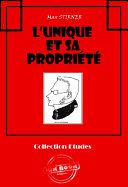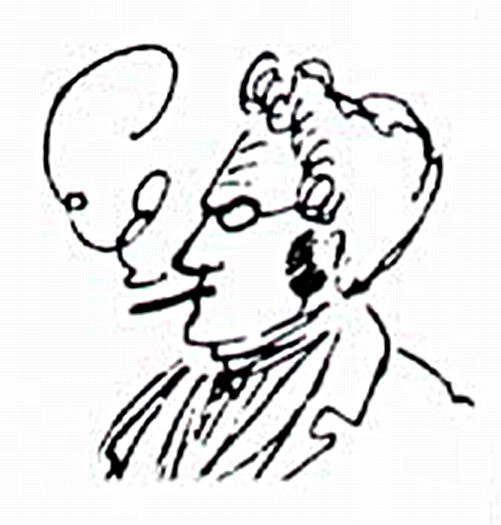L'Unique et sa propriété, 1844
Œuvres

L'Unique et sa propriété
Max StirnerMax Stirner citations célèbres
L'Unique et sa propriété, 1844
Max Stirner: Citations en anglais
The state calls its own violence law, but that of the individual, crime.
As quoted in The Great Quotations (1960) by George Seldes, p. 664
The Ego and Its Own (1845)
“All things are Nothing to Me”
Source: The Ego and Its Own
S. Byington, trans. (1913), p. 421
The Ego and Its Own (1844)
Contexte: Revolution is aimed at new arrangements; insurrection [Empörung] leads us no longer to let ourselves be arranged, but to arrange ourselves, and set no glittering hopes on “institutions.”
“What is not supposed to be my concern!”
Cambridge 1995, p. 5
The Ego and Its Own (1844)
Contexte: What is not supposed to be my concern! First and foremost, the Good Cause, then God's cause, the cause of mankind, of truth, of freedom, of humanity, of justice; further, the cause of my people, my prince, my fatherland; finally, even the cause of Mind, and a thousand other causes. Only my cause is never to be my concern. "Shame on the egoist who thinks only of himself!"
“The divine is God's concern; the human, man's.”
Cambridge 1995, p. 7
The Ego and Its Own (1844)
Contexte: The divine is God's concern; the human, man's. My concern is neither the divine nor the human, not the true, good, just, free, etc., but solely what is mine, and it is not a general one, but is — unique, as I am unique. Nothing is more to me than myself!
“Whoever will be free must make himself free. Freedom is no fairy gift to fall into a man's lap.”
As quoted in Forbes Vol. 78 (1956), and in Lifetime Speaker's Encyclopedia (1962) by Jacob Morton Braude, p. 275
Contexte: Whoever will be free must make himself free. Freedom is no fairy gift to fall into a man's lap. What is freedom? To have the will to be responsible for one's self.
“Thus the radii of all education run together into one center which is called personality.”
Source: The False Principle of our Education (1842), p. 25
“Liberty of the people is not my liberty!”
Cambridge 1995, p. 190
The Ego and Its Own (1845)
Wollen wir etwa die Pädagogik den Philosophen in die Hände spielen? Nichts weniger als das! Sie würden sich ungeschickt genug benehmen. Denen allein werde sie anvertraut, die mehr sind als Philosophen, darum aber auch unendlich mehr als Humanisten oder Realisten.
Source: The False Principle of our Education (1842), p. 19
Ich setze Mich nicht voraus, weil Ich Mich jeden Augenblick überhaupt erst setze oder schaffe, und nur dadurch Ich bin, dass Ich nicht vorausgesetzt, sondern gesetzt bin, und wiederum nur in dem Moment gesetzt, wo ich mich setze, d.h. Ich bin Schöpfer un Geschöpf in Einem.
Cambridge 1995, p. 135
The Ego and Its Own (1845)
Source: The False Principle of our Education (1842), p. 23
Source: The False Principle of our Education (1842), p. 28
Source: The False Principle of our Education (1842), p. 21
Source: The False Principle of our Education (1842), p. 22
“Man with the great M is only an ideal, the species only something thought of.”
Dover 2005, p. 182
The Ego and Its Own (1845)
Source: The False Principle of our Education (1842), p. 23
Source: The False Principle of our Education (1842), p. 22
Source: The False Principle of our Education (1842), p. 23
